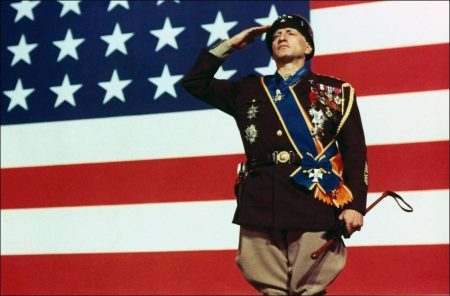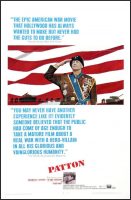Patton movie storyline. The epic film biography, shot in 70 mm. widescreen color, of the controversial, bombastic, multi-dimensional World War II general and hero George S. Patton. The larger-than-life, flamboyant, maverick, pugnacious military figure, nicknamed “Old Blood and Guts,” was well-known for his fierce love of America, his temperamental battlefield commanding, his arrogant power-lust (“I love it. God help me, I do love it so.
I love it more than my life”), his poetry writing, his belief in reincarnation, his verbal abuse and slapping of a battle-fatigued soldier, his anti-diplomatic criticism of the Soviet Union, and his firing of pistols at strafing fighter planes. The bigger-than-life screen biography is most noted for its brilliant opening monologue by Patton (Scott), delivered before a gigantic American flag to the off-screen troops of the Allied Third Army (“No bastard ever won a war by dying for his country. You won it by making the other poor dumb bastard die for his country”).
The story was based on two books: Patton: Ordeal and Triumph by Ladislas Farago and A Soldier’s Story by General Omar Bradley (portrayed by Malden). As a result of Francis Ford Coppola’s breakthrough win for Best Adapted Screenplay as co-screen writer, he went on to write and direct The Godfather (1972). Although Scott portrayed the famous general perfectly and it became his archetypal film, the role was also considered by Burt Lancaster, Rod Steiger, Lee Marvin, Robert Mitchum and John Wayne. The subject matter was remade as a TV-movie entitled The Last Days of Patton (1986), also with Scott in the lead role.
Patton is a 1970 American epic biographical war film about U.S. General George S. Patton during World War II. It stars George C. Scott, Karl Malden, Michael Bates and Karl Michael Vogler. It was directed by Franklin J. Schaffner from a script by Francis Ford Coppola and Edmund H. North, who based their screenplay on the biography Patton: Ordeal and Triumph by Ladislas Farago and Omar Bradley’s memoir A Soldier’s Story. The film was shot in 65mm Dimension 150 by cinematographer Fred J. Koenekamp and has a music score by Jerry Goldsmith.
Patton won seven Academy Awards, including Best Picture and Best Original Screenplay. Scott won Best Actor for his portrayal of General Patton, but declined to accept the award.
The opening monologue, delivered by George C. Scott as General Patton with an enormous American flag behind him, remains an iconic and often quoted image in film. The film was successful, and in 2003, Patton was selected for preservation in the United States National Film Registry by the Library of Congress as being “culturally, historically or aesthetically significant”.
Patton (1970)
Directed by: Franklin J. Schaffner
Starring: George C. Scott, Karl Malden, Stephen Young, Michael Strong, Morgan Paull, Carey Loftin, Albert Dumortier, Pat Zurica, James Edwards, Lawrence Dobkin, David Bauer, John Barrie
Screenplay by: Francis Ford Coppola, Edmund H. North
Cinematography by: Fred J. Koenekamp
Film Editing by: Hugh S. Fowler
Set Decoration by: Antonio Mateos, Pierre-Louis Thévenet
Art Direction by: Urie McCleary. Gil Parrondo
Music by: Jerry Goldsmith
Distributed by: 20th Century Fox
Release Date: April 2, 1970
Views: 264

